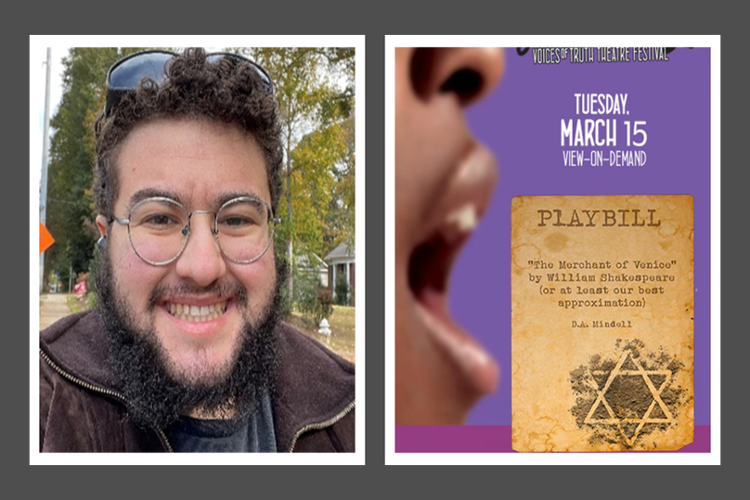Student Spotlight: Mindell Explores Jewish Themes in Playwriting

Across the diverse cast of Emory undergraduate students, Drew Mindell (22C) stands in his own spotlight as an aspiring playwright who often uses his medium to explore Jewish themes. With multiple awards already under his belt, Mindell has authored standout pieces including Made Me A Match, winner of the Georgia Theater Conference's one-act play competition; and ‘The Merchant of Venice’ by William Shakespeare (or at least our best approximation), which won the prestigious David L. Shelton Award and earned a staged reading through the 2021 Kennedy Center's American College Theater Festival.
A playwriting major and Hebrew minor, Mindell’s interests are rooted in his experience with theater, which began in childhood through a community group, the B’nai Jacob Players, run by his hometown synagogue. While growing to feel like acting might not be his main strength, Mindell still loved being involved in all that went into producing a play. “Simultaneously,” he reflects, “I’d always loved to read, stories, and playing pretend as a kid. It evolved into a realization that playwriting was something I really enjoyed, was good at, and it took off from there.”
Mindell started writing more seriously in high school, and while looking at colleges prioritized finding one with a strong intersection between the English and Theater departments, which drew him to Emory to hone his craft. Here he joined Emory’s musical theater group, Ad Hoc, and has penned some of his most prominent plays to date.
One such play, ‘The Merchant of Venice’ by William Shakespeare (or at least our best approximation), depicts a group of Jewish artists who stage the 16th-century Shakespearian production in the Theresienstadt concentration camp. Their story is told through the eyes of troupe member Isadore Altshuler, who, thirty years after these events, recounts his imprisonment in the Theresienstadt camp-ghetto, the people he met, and the art he and the other actors managed to create within the oppressive circumstances of the horror surrounding them. Over the course of the show, the troupe navigates the loss of murdered group members and loved ones, the moral dilemma of creating art for their captors in exchange for food, and the challenge of clinging to hope in the darkest of times.
Mindell’s idea for the play was conceived during a trip to a Holocaust memorial as part of Emory’s Summer Undergraduate Research Experience (SURE) program. At the memorial, he got a feel for the terrible conditions inmates of concentration camps experienced, and also learned how the Nazis often forced the Jewish artists they imprisoned to use their creative skills in the service of Nazi propaganda. From there, Mindell began researching the history of Theresienstadt and Yiddish theater in order to write scenes and dialogue in the same style used by people of the time.
Along with his work in theater and playwriting, Mindell also has a strong interest in disability advocacy, and is a co-founder of the Emory Disability Advocacy Group. He is currently working on an honors thesis in Emory’s Playwriting/Creative Writing Program that combines his two passions. His thesis highlights assistive technology—technology that is used by people with disabilities to perform functions that might otherwise be difficult or impossible—and he has been interviewing professionals in the industry to gain the insights needed to compose a play about an assistive technology conference. The cast consists of both abled and disabled characters—which he hopes to be played by appropriately representative actors—and he envisions the show itself being as accessible as possible, with supertitles, ASL interpretation, and more.
Ultimately, Mindell utilizes his art to help people engage in difficult subjects and enjoy themselves while doing it. To that end, he remarks, “When it comes to my work, there are two words that come to mind: laughter and justice. In my work I do like to take the time and effort to represent marginalized communities and experiences. . . My work is good at putting people in a comfortable place to get uncomfortable, and set them at ease to where they can address the difficult stuff.”
Looking to the future, Mindell is in the process of applying for master’s programs with the aim of making a living as a working playwright and having his work produced. If you are interested in viewing and/or supporting his current work, ‘The Merchant of Venice’ by William Shakespeare (or at least our best approximation will be featured in the March 2022 Powerstories Theatre Festival, broadcast virtually online.